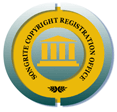
Benefits of Copyright Registration
Copyright is essentially a private right. You, the copyright owner must decide how to exploit your copyright work and how to enforce your copyright. A copyright owner can decide whether or not there will be any use of the copyright work falling within the scope of the economic rights and, if so, whether he or she will use the copyright work and/or license one or more other people to use the work.
A copyright owner can also benefit from copyright by selling or agreeing a transfer of copyright to someone else.
Many of the options available to a copyright owner will involve contractual agreements which may be just as important as the rights provided by copyright law. The right contractual agreement can minimise the chances of a dispute over use of your copyright work.
To help protect your copyright work, it is advisable to mark it with the © symbol, the name of the copyright owner and the year of publication. Although this is not essential, it will let others know when the term of protection started and hence whether it is still covered by copyright, and indicate who to approach should they need to ask permission to use the work.
What is copyright?
Copyright protects creative or artistic works. You should only copy or use a copyrighted work with the copyright owner's permission.
Copyright protects:
- literature, including novels, instruction manuals, computer programs, song lyrics, newspaper articles, website content and some types of database
- drama, including dance or mime
- music
- art, including paintings, engravings, photographs, sculptures, collages, architecture, technical drawings, diagrams, maps and logos
- layouts used to publish a work, for a book
- recordings of a work, including sound and film
- broadcasts of a work
Copyright applies to any medium. This means that you must not reproduce copyright protected work in another medium without permission. This includes, publishing photographs on the internet, making a sound recording of a book, and so on.
Copyright does not protect ideas for a work. However, when an idea is fixed, for example in writing, copyright automatically protects it. This means that you do not have to apply for copyright.
A copyright protected work can have more than one copyright, or another intellectual property right, connected to it. For example, an album of music can have separate copyrights for individual songs, sound recordings, artwork, and so on, whilst, copyright protects the artwork of your logo, but you could also register the logo as a trade mark.
Original works
A work can only be original if it is the result of independent creative effort. It will not be original if it has been copied from something that already exists. If it is similar to something that already exists but there has been no copying from the existing work either directly or indirectly, then it may be original.
The term "original" also involves a test of substantiality - literary, dramatic, musical and artistic works will not be original if there has not been sufficient skill and labour expended in their creation. But, sometimes significant investment of resources without significant intellectual input can still count as sufficient skill and labour.
Ultimately, only the courts can decide whether something is original.
There is much case law indicating, for example, that names and titles do not have sufficient substantiality to be original and that, where an existing work is widely known, it will be difficult to convince a court that there has been no copying if your work is very similar or identical.
Works that are not required to be original
Sound recordings, films and published editions do not have to be original but they will not be new copyright works if they have been copied from existing sound recordings, films and published editions.
Broadcasts do not have to be original, but there will be no copyright, if, or to the extent that, they infringe copyright in another broadcast.
Copyright applies to